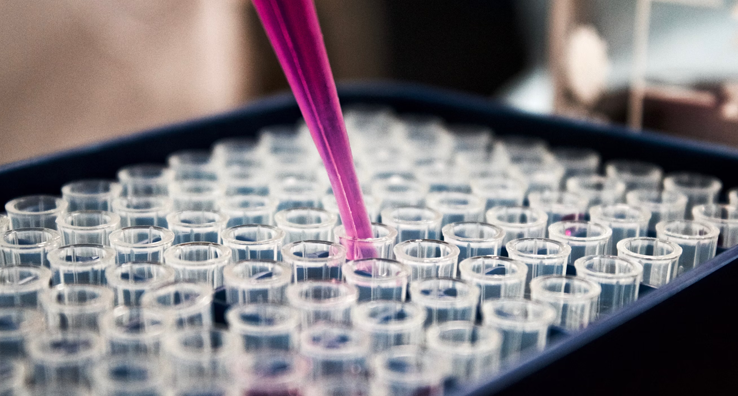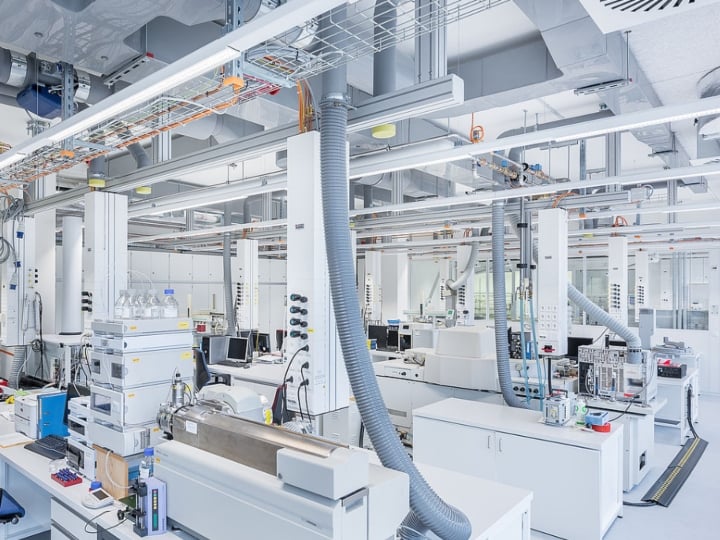Extractables and leachables to quantify risks associated with leachable impurities from container closure systems for packaging human drugs, process equipment or medical devices
Extractables and leachables testing is critical for identifying and quantifying potentially harmful leachables that could migrate from pharmaceutical container closure systems, contaminating pharmaceutical products and pose a risk to patient health, whilst causing significant quality issues.
An extractables and leachables (E&L) study can help identify potential sources of leachables through controlled extractables studies (CES), which establish a profile of extractable components. Potential sources of leachables include antioxidants, plasticizers, dyes, metal catalysts, and polymer degradation products. These can present a toxicological risk and may also exacerbate drug degradation, particularly for biopharmaceuticals.
Pharmaceutical packaging, bioprocess materials, drug delivery systems, or implantable medical devices, are complex and may include plastic, polymer, rubber and glass material components, as well as printed surfaces, and coatings. It is critical that extractables and leachables testing programs are specifically designed for your drug product and storage container materials (both primary and secondary containers) to assess the risks associated with leachable impurities.
Regulatory agency expectations for extractables and leachables testing are continually evolving, with increasingly stringent requirements for the evaluation of drug product packaging associated with each new product. Our scientists conduct E&L analysis studies in accordance with regional guidance and nationally and internationally recognized standards, including Good Manufacturing Practice (GMP), Product Quality Research Institute (PQRI) extractables and leachables guidelines, United States Pharmacopeia (USP) requirements (e.g., USP chapters <665>, <1665>, <1663>, <1664>, and <1664.1>), European Medicines Agency (EMA) guidance, US Food and Drug Administration (FDA) guidance, BioPhorum/BPOG guidance, and ISO 10993-18 extractables and leachables guidelines (Part 18).
Extractables and leachables strategies
As an initial step, we aim to gather all information about your packaging system in order to build a robust picture of potential sources of leachables. The combination of our experience in method development for a controlled extractables study, coupled with our vast knowledge of leachable compounds and guidelines, means that we can anticipate and identify potential sources of risk associated with leachable impurities through strategic screening studies.
Our analytical teams can determine both organic and inorganic contaminants through the application of a range of advanced analytical instrumentation including liquid chromatography with HRAM-mass spectrometry detection (LC-MS/MS), gas chromatography with enhanced resolution or HRAM-mass spectrometry (GC-MS/MS), and inductively coupled plasma spectroscopy (ICP-OES or ICP-MS). In addition to the solvent-based extractions, we also apply various high performance automated solventless extraction methods, such as solid-phase microextraction (SPME), dynamic head-space and thermal desorption for better characterisation and understanding of materials.
Typical study types include extractables assessment of container closure systems and packaging components, leachables evaluations of drug products from stability testing, and leachables evaluations of manufacturing surfaces or single-use systems used in bioprocessing equipment.
We provide leachables method validation compliant to Good Manufacturing Practice (GMP) for use in GMP stability testing and storage programs and can support a wide range of closure or drug delivery systems such as pre-filled syringes, large volume parenteral products, orally inhaled and nasal drug products (OINDP), single-use and disposable medical equipment, printed packaging or secondary packaging migration behavior (labels, inks and dyes). Leachables associated with medical devices (ISO10993-18), drug delivery systems and implantable medical devices.
Controlled extractables studies
- Method development for controlled extractables studies
- Identification of extractables using GC-MS, GC-MS/MS and LC-MS/MS, according to USP <1663> Assessment Of Extractables Associated With Pharmaceutical Packaging/Delivery Systems
- Complex polymer formulation component identification
- Screening or quantitative studies for additives and stabilizer ingredients and their degradation products
- Rapid, decisive identification of extractables including transformation or degradation products
- Modifying specific controlled extractables methods for routine E&L testing
- Extractables studies for medical devices and medical and pharmaceutical packaging
Leachables substances programs:
- Complete identification of leachables for pharmaceutical packaging, drug delivery systems, implantable medical devices and other devices
- Method validation compliant to Good Manufacturing Practice (GMP)
- Assessment of leachables according to USP <1664> Assessment Of Drug Product Leachables Associated With Pharmaceutical Packaging/Delivery Systems
- Assessment of specific considerations for leachables in orally inhaled and nasal drug products (OINDP), including metered dose inhalers (MDIs); nasal sprays; inhalation solutions, suspensions, and sprays; and dry powder inhalers (DPIs) according to USP <1664.1>
Our global E & L analysis expertise
Our experts have over 30 years of experience in specialized analytical and toxicology assessment for extractable leachable testing. Intertek offers extractables and leachables testing services through GMP-compliant laboratories located in Whitehouse, NJ (USA) and Basel (Switzerland) with research support from our Mumbai (India) facility, as part of our commitment to Total Quality Assurance. Our E&L expertise reinforced by our knowledge of polymer, plastic and packaging materials, allowing us to identify components from the most complex polymer formulation including adhesives, additives and stabilizer ingredients and their degradation products. Our consultants provide first-class evaluation and assessment of existing E&L data gaps, and through strategic screening or quantitative studies, we offer the right study for your product.
Toxicological risk assessments
Toxicological assessments to quantify a patient's exposure to each chemical and gauge the level of risk posed by these materials can be conducted using the data from an extractable and leachables analysis. Our in-house toxicologist consultants perform evaluation and safety assessment reviews in order to identify and address potential risks and to assist with comprehensive pharmaceutical impurity testing, whilst identifying any gaps in your existing data packages. We also provide recommendations and support for preparation of very low-risk data packages related to E/L testing.
What is the difference between extractables and leachables?
Extractable Definition:
The US Food and Drug Administration (FDA) defines extractables as compounds that can be extracted from a container closure system or drug product packaging component (container, tubing, seal, device) during an extraction with aggressive conditions including exposure to an extraction solvent and elevated temperatures). Extractables can be potential leachables.
Leachable Definition:
A leachable substance is a compound that can migrate or leach into a drug product formulation over time from the packaging or device component or through contact with a production material or as a result of direct contact with the drug formulation. Leachables are generally a subset of extractables species - but not always.
Pharmaceutical News & Events
- Watch our RDD2024 Workshop on Generic Nasal Suspensions
- Determination of Particles in Pharmaceuticals - Article
- Discover our Audit Live Tool for direct access to our scheduled audits
- Extractables/Leachables Lab Tour - Request access
- Medical Device Extractables & Leachables Studies
- Glycosylation Analytical Approaches for Antibody Therapeutics
- Rapid Determination of Low/Trace Level Benzene in Pharmaceutical Excipients and Finished Products
- mRNA Analytics: Capping Efficiency, Sequencing, Poly-A Tail, dsRNA


